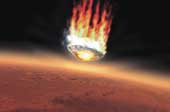 |
| An artist’s impression shows Beagle 2 landing on Mars with a shield protecting it from the heat generated by friction with the Martian atmosphere. (Reuters) |
London, Dec. 25 (Reuters): A groundbreaking British mission to answer the question “Is there life on Mars?” suffered a major setback today when a tiny space probe failed to broadcast an audible signal to confirm it had landed on the red planet.
Scientists said the silence from space did not necessarily mean the Beagle 2 probe had gone the way of so many other Mars missions before it — and crashed.
They were waiting for a second contact opportunity later on Christmas Day, hopeful that the first fully European mission to be sent to any planet was still on track.
Beagle 2, no bigger than an open umbrella, was due to land on Mars in the early hours today, and scientists had hoped a mission rocket orbiting the planet would pick up a tune signalling a safe arrival.
But by 0615 GMT the rocket had passed out of the potential signal range without hearing anything from the 34-kg probe.
“We’re disappointed, but it’s not the end of the world,” said mission head Colin Pillinger.
“We’re not down-hearted yet,” he told reporters at mission headquarters in London, decorated with Christmas lights and tinsel for a party which never happened.
The next opportunity to hear a signal will be 2200 and 2400 GMT, when the giant Jodrell Bank telescope in central England will be pointing at Mars.
“I’m afraid it’s the usual England scenario — we’ve got to play extra time.”
There was disappointment also in Germany, where dozens of scientists were monitoring the mission at the headquarters of the European Space Agency in Darmstadt, south of Frankfurt.
Pillinger said Beagle 2 might have been blown off course by dust clouds and storms which regularly sweep the surface of the volatile planet, 100 million km from Earth.
Alternatively, its antennae might be pointing in the wrong direction for the rocket to pick up its signal — a nine-note tune composed for the occasion by British pop group Blur.
Beagle 2 is packed with state-of-the-art scientific instruments to scrape, bore and bake samples from the surface of Mars, seeking signs of whether the planet could sustain life.
But Mars has a formidable record as a graveyard for pioneering space missions.
It is estimated that around two in every three missions to the planet have been whole or partial failures, and both Russian and US probes have ended their lives as scrap metal strewn across the forbidding Martian landscape.
“We’re hoping against hope that we do actually get something from Beagle today,” said Andrew Coates from University College London who is working on the project.
“Getting the signal tonight is going to be absolutely crucial in knowing whether it’s alive or not.”
Before then though, Beagle 2 must weather a chilly and comfortless first night alone on Mars, assuming it has survived.
The temperature on the planet was due to plummet from zero to -90 degree Celsius before then, testing the mettle of the probe’s electronics.











